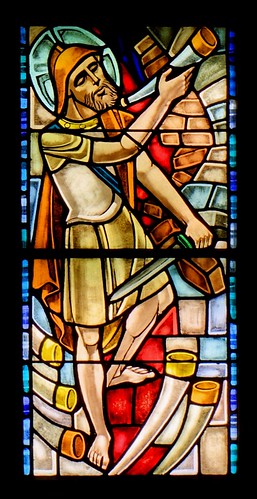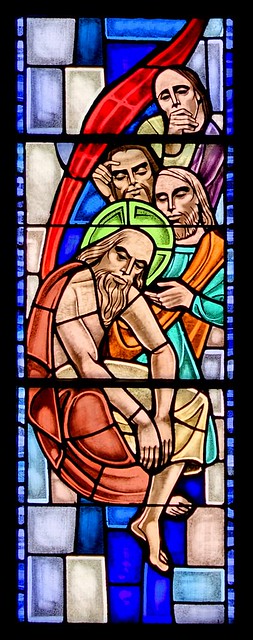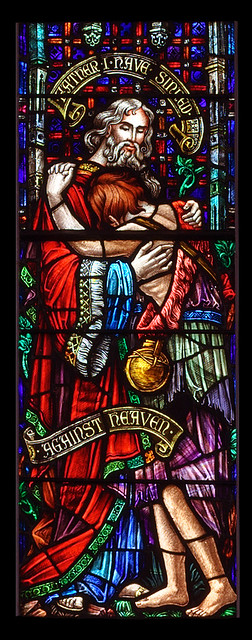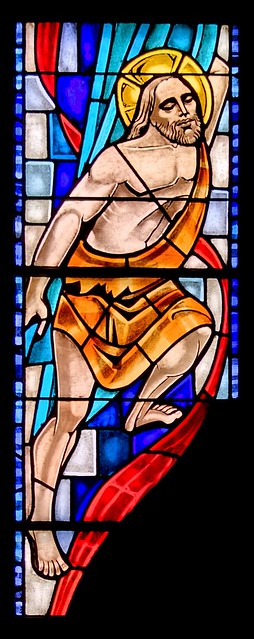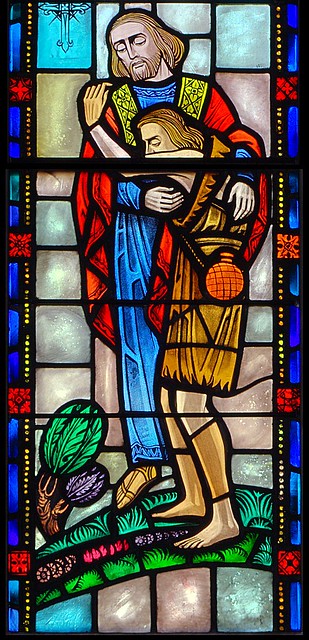by
Pastor Paul Wolff
 |
Most images of this event in Luke 2
can be somewhat misleading.
The boy Jesus came to learn, not to teach.
|
“And
the child (Jesus) grew and became strong, filled with wisdom. And the
favor of God was upon him. Now his parents went to Jerusalem every
year at the Feast of the Passover. And when he was twelve years old,
they went up according to custom. And when the feast was ended, as
they were returning, the boy Jesus stayed behind in Jerusalem. His
parents did not know it, but supposing him to be in the group they
went a day’s journey, but then they began to search for him among
their relatives and acquaintances, and when they did not find him,
they returned to Jerusalem, searching for him. After three days they
found him in the temple, sitting among the teachers, listening to
them and asking them questions. And all who heard him were amazed at
his understanding and his answers. And when his parents saw him, they
were astonished. And his mother said to him, “Son, why have you
treated us so? Behold, your father and I have been searching for you
in great distress.” And he said to them, “Why were you looking
for me? Did you not know that I must be in my Father’s house?”
And they did not understand the saying that he spoke to them. And he
went down with them and came to Nazareth and was submissive to them.
And his mother treasured up all these things in her heart. And Jesus
increased in wisdom and in stature and in favor with God and man.”
(Luke 2:40-52)
God’s
Word is the greatest treasure on earth. There is nothing on earth
that can give you the blessings that God’s word can give. God had
the Holy Bible written to show us what He has done to save us, so
that we might trust in Him and be saved through that faith. God
Himself works through His Word to bring you forgiveness and
salvation. Nothing else in all the world can save you from sin and
death and give you eternal life in God’s paradise. That is why
God’s Word is such a great treasure.
 |
The Word became flesh and dwelt among us,
and we have seen his glory,
glory as of the only Son from the Father,
full of grace and truth. (John 1:14)
|
God’s
Word is such a treasure that God has made sure that from the time
that Moses wrote the first five books about 3,500 years ago until
now, the Holy Bible has been preserved so that at all times in
history God’s people could hear it or read it and learn that God is
our loving Father and creator and redeemer. God’s Word first shows
us that we are all sinners, descended from Adam and Eve, and we would
all be under God’s condemnation, but for God’s mercy. This is
likely why more people do not appreciate this great treasure. Sinners
don’t like to be reminded of the truth of our sin. We like to think
we are better than we are, and more holy. The truth, however, is that
we are rebellious sinners, and we all desperately need God to save us
from death, which is the condemnation of sin. Every person who ever
lived on earth before 1903 has died. That includes the one man who
never sinned nor deserved death, but who gave His life to redeem us
all from the curse of sin. That man is Jesus. We need to hear the
truth of our sin, no matter if we want to or not. If we deny the
truth of our sin, then we will deny the blessings God has provided
for us in Jesus. But, as Saint John wrote, “If
we confess our sins, (God)
is faithful and just and will forgive us our sins and purify us from
all unrighteousness.” (1
John 1:9)
 |
God became incarnate as a man
to redeem sinners from sin and death.
|
God’s
Word does not only tell us how bad we are, and how much we need a
savior, but it also shows us what God has done through Jesus to
rescue and redeem us from the consequences of our sin. God, in His
essence, is a Spirit, and He is eternal and cannot die. In order for
Him to provide for our redemption the Second Person of the Trinity
became incarnate as a baby who grew into a man. He is like us in
every way, except without sin. Jesus had to be a man so that He could
not only keep and fulfill God’s Law, but so that He could offer His
life in payment for the lives of all of us sinners. We might not know
any of this, except for the fact that God had it written down and
preserved for us to hear and read and know, so that we may be saved.
The
Bible was not just written for you and me. God also had it written
and preserved for Jesus, also. When Jesus read the Bible it was a
little different! The Bible Jesus read was not different than
what we read today, but Jesus is a little different than us because
He is holy and sinless. Also, because the Bible is all about Jesus,
it affected Him a little differently. Jesus once told the Pharisees,
“You diligently study the Scriptures because you think that
by them you possess eternal life. These are the Scriptures that
testify about me, yet you refuse to come to me to have life.”
(John 5:39-40)
In
His state of humiliation, Jesus did not remember being equal with God
the Father, and the Holy Spirit. He had to learn about God the same
way we do – by reading the Holy Bible. Jesus also had to trust that
the Bible is God’s Word, and is completely true. This was
especially important when Jesus was dying on the cross. When He was
suffering the Father’s wrath for the sins of the world, He only had
to rely on God’s promises in the Holy Scriptures that this was
God’s will, and that everything He was doing would work out for the
glory of God, and the salvation of the human race.
 |
God’s Law is good and righteous
but it condemns sinners.
Jesus had no sin and was not condemned by God’s Law.
|
God’s
Law did not condemn Jesus – because He did not inherit the
corruption of sin from His mother, and He committed no sin in His
life. Jesus happily obeyed God’s Law because as the Son of God, the
Commandments of God completely fit with His holy nature. Where we
would naturally rebel against God’s commands, Jesus
naturally obeyed
God’s commands, and was happy to do so. We,
too should be happy to obey God’s commands, because they are good
and
right and beneficial to each one of us and to our neighbors,
but because we are corrupted by sin, we don’t always do so.
Also,
Jesus had a slightly different perspective concerning the salvation
promised for us. Jesus did not need salvation from sin, since He had
no inherited sin. Also,
because Jesus was sinless in
everything He did,
He was not condemned by God’s Law. However,
Jesus was the one sent from God to pay the price for the salvation of
us sinners. Though, because the price was the sacrifice of His life,
the
promise of salvation which gives us great hope and comfort was a
death sentence for Jesus, if He was willing to endure it.
Jesus
would need to
trust in God the Father to rescue
Him
from
death if He accepted the Father’s will and desire that He
would give His life in exchange for our forgiveness and salvation.
The
Father did not force Jesus to give up His life, and suffer and die
for sinners, but because it was the Father’s will that Jesus would
redeem us from our sins, then Jesus was willing to please the Father
and do what was needed to save us from our sins – including
innocently suffering crucifixion and God’s wrath over our sins, and
dying to pay the price for sin.
Luke
tells us that Joseph and Mary went to Jerusalem every year for the
feast of the Passover. He doesn’t tell us if Jesus went with them
also, but, whether
He did nor not,
the year he turned 12 was special. He had attained a certain level of
maturity, and was likely
allowed
a little more freedom and autonomy than before. I’m sure it helped
that Jesus was perfectly obedient and sinless, because Joseph and
Mary knew they could trust Him to do what He ought to do. Though,
on this occasion, what Jesus rightly did, was not particularly what
they expected Him to do.
 |
It is likely that Jesus came to learn
about God’s mercy for His people
in the events of the Passover.
|
Luke
doesn’t tell us what Jesus and the teachers talked about, but an
obvious topic of conversation would have been the Passover, and its
meaning for Israel, and for the Messiah. He
might have asked something like, “What
was the Passover all about?” They would have told Him, “The
Passover was the salvation of the people of Israel. God had decreed
that the firstborn in every household of Egypt would die. However,
among the Israelites, God would accept a substitute – a lamb –
who would be sacrificed instead of the firstborn. The substitute, the
lamb, would die, so that the firstborn child would live. This showed
God’s mercy and love.” Jesus
would have learned that it is good and right to love God with all His
heart, soul, mind and strength. God is a just and righteous God, but
He is also merciful and forgiving to sinners, and loves them. Because
Jesus is one with the Father and the Holy Spirit, He also felt the
same way about sinners, even as a boy, and even later as a man.
If
people sin against you, you likely would want revenge, or at least
just punishment. You are not likely to suffer and die for the people
who betrayed you, or hurt you, or murdered you. But Jesus is
different.
When
the twelve year old Jesus was talking with the teachers in the
temple, He might also have asked what the events of the Passover had
to do with the Messiah. If they didn’t have a quick answer, Jesus
likely would have quoted other Scriptures which would have led them
to the correct answer. “Why does Isaiah write, ‘Surely he
has borne our griefs and carried our sorrows; yet we esteemed him
stricken, smitten by God, and afflicted. But he was pierced for our
transgressions; he was crushed for our iniquities; upon him was the
chastisement that brought us peace, and with his wounds we are
healed. All we like sheep have gone astray; we have turned—every
one—to his own way; and the Lord
has laid on him the iniquity of us all.’”? Something like
this is likely why the teachers were impressed with the questions
that Jesus asked. The events of the Passover were a prophetic type of
how the Messiah would come and save the world from the condemnation
of their sins. The Messiah would offer His life in place of all
people – like a substitutionary sacrificial lamb, so that He would
take the punishment of death, and so all people would have
forgiveness. Not everyone would receive the benefits of this
forgiveness, only those who believe, but the forgiveness was there
for everyone, if they wanted it.
What
this meant for Jesus was that He was the sacrificial lamb of God who
was going to have to offer His life to God the Father in place of all
sinners in the world, so that He would bear the punishment for our
sin, so that we would be forgiven and live. The amazing thing about
the love that Jesus had for God the Father, is that when Jesus
realized that He would have to endure God’s wrath for all the sins
of the world, and die for wicked, rebellious sinners like all the
rest of us, Jesus did not reject this plan, but agreed to do it
because it was God’s Will. Jesus was willing to suffer and die as
an innocent lamb to pay for the sins of every wicked sinner who ever
was conceived on earth, and whoever would be conceived until the last
day. This is the great love that God has for us – that He would
live as a man in a sinful world, and still die to save sinners!
 |
Jesus is the lamb of God
who takes away the sin of the world.
|
The
Word of God brings all this to us, but that is not the only treasure
that God gives us. God also combines His holy Word with water in Holy
Baptism to wash away our sins and to give us a new birth as God’s
beloved children. Jesus also combines His holy Word with bread and
wine to give each one of us His body and blood which he sacrificed to
pay for our sins. Just as the Israelites in Moses’ day ate the
sacrificial lamb who saved the firstborn from the Angel of Death, and
thus received the blessings of that sacrifice, Jesus offers us His
body and blood in the Lord’s Supper that we may receive the
blessings of His sacrifice. These blessings include the forgiveness
of sins, and victory over sin and death. Jesus shares these treasures
with us to make us His children and keep us in the faith until he
comes to take all His children to His heavenly kingdom where we will
live forever in holiness with Jesus.
When
Joseph and Mary found Jesus in the temple in Jerusalem He told them
that He had to be doing His Father’s business, but Jesus also
submitted to His earthly parents and obeyed them like a good and holy
child. All this Jesus did out of love for you, so that you may know
the love of God, and trust in Jesus to save you from your sins. What
a great treasure we have here today. May you treasure God’s Word as
the most valuable thing on earth, and trust in Jesus to save you from
your sins and give you everlasting life.
 |
Jesus is always doing His Father’s Business
|










